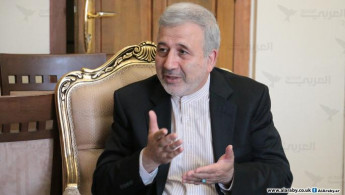Exclusive: Iran diplomat reveals path to rapprochement with Saudi Arabia
On 10 March 2023 came the shock announcement that China had successfully mediated the resumption of diplomatic relations between Saudi Arabia and Iran after seven years of bitter enmity.
Questions still abound as to what led to the announcement, what will result from it for both countries and what the consequences for the region will be.
Al-Araby Al-Jadeed's correspondent in Iran discussed the China-brokered deal with the director general of Iran's Foreign Ministry Office for Persian Gulf Affairs, Alireza Enayati, who took part in all the sessions between Iran and Saudi Arabia held in Baghdad, Muscat, and, most recently Beijing.
Background to the agreement
The years of estrangement between Saudi Arabia and Iran had not benefitted either party and both states realised that, Enayati said.
"A dialogue-based approach has overcome a no-dialogue-based approach", he said.
"We all know there are […] crises in the region, but how should these be addressed and managed? Dialogue is [needed] not only to bring benefits but also to stave off disaster," he added.
Enayati said that Iran had always wanted good relations with its neighbours and had always called for dialogue, clarifying that the Beijing agreement should be viewed as a juncture in a continuing process, which began two years ago in Baghdad.
In five sessions in Baghdad and others in Muscat, the ground had been laid for the "positive results" being seen now, said Eyanati, with China's intensive mediation efforts giving a "strong impetus" to a dialogue already underway, and enabling the two parties to take this major step forward.
Iran has thanked Saudi Arabia for its help in evacuating Iranian nationals from Sudan, where fighting between rival generals rages onhttps://t.co/oPZsx3NrcQ
— The New Arab (@The_NewArab) May 2, 2023
Bilateral discussions with security focus
Enayati explained that to date all the discussions had focused on bilateral (and especially security) issues between Saudi Arabia and Iran, like the resumption of previous agreements, and flights and visas for both countries' citizens, for example, and had not dealt with regional matters.
At the most recent meeting in Beijing on 6 April, "stability and sustainable security" had been the focus once more, according to a tweet by Iranian Foreign Minister Hossein Amirabdollahian.
While observers had emphasised Saudi Arabia's rapprochement with Yemen's Houthi rebels, which was announced one day after the Beijing announcement, Eyanati said that there was no link between the two and that no other regional issue had been discussed either.
However, he added that the Iran-Saudi agreement and an improvement in their relations would certainly have "positive reflections" across the region and enhance other opportunities for regional cooperation.
Reopening the embassies
According to the announcement of 10 March, the embassies in both countries will be officially reopened "within two months" but Eyanati said the timeframe was not yet final due to bureaucratic processes and because both sets of embassy buildings needed restoration, which was underway but would take time after years of disuse.
However, both Iran and Saudi Arabia had teams working on this and the embassies would be open before the Hajj season at the end of June, he said.
This article is based on an interview published in Al-Araby Al-Jadeed, The New Arab's Arabic-language sister publication. To read the full interview in Arabic click here.





 Follow the Middle East's top stories in English at The New Arab on Google News
Follow the Middle East's top stories in English at The New Arab on Google News


![MP Essam Diab's pursuit to block TikTok in Egypt has revived an already ongoing debate in the country. [Getty]](/sites/default/files/styles/image_330x185/public/1230748046.jpeg?h=a5f2f23a&itok=-8MqBLLC)